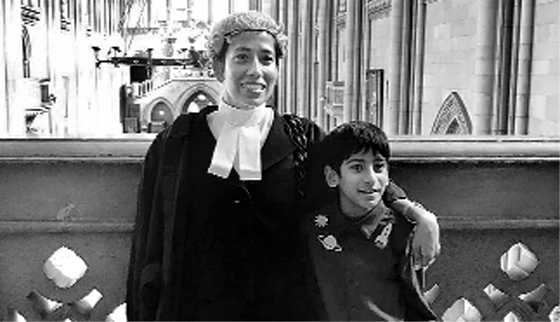
Maya Sikand with her son at the swearing-in ceremony
Sarika Sharma
Last month, Maya Sikand, a civil liberties and human rights barrister, was appointed by the Queen as a Recorder, a part-time judge in the criminal jurisdiction in April this year. Her appointment is a rare achievement, for, only a quarter of the total appointments this year are women (35 out of 146); of the 35 women, only two are from ethnic minorities. Sikand will now try criminal cases (including jury trials) and will have to sit for a minimum of six weeks a year in the Crown Court.
Born in India, she moved to the UK in 1980 when her father got a job there. She now practices in civil liberties and human rights law, but was drawn to human rights work even as a student and, after graduation from Corpus Christi College, Oxford, became a volunteer for an organisation working with women and children fleeing domestic violence. Subsequently, she was employed by an organisation working with young South Asian women fleeing domestic violence and sexual abuse. “In effect, I became an advocate for the voiceless. This led me to the Bar and in particular to a Chambers that specialised in human rights and civil liberties,” says Sikand, who has been a barrister at Garden Court Chambers since 1997.
She began as a criminal defence jury advocate but after 12 years, she became a mother and left criminal practice to focus on public interest litigation and private law damages claims against public bodies, including the police and the prison service. A case that is very close to her heart came about when a prison refused a pregnant prisoner a place in a Mother and Baby Unit (MBU). Her baby was taken from her at birth and placed in the care of the state. A single mother, Sikand's heart went out to both.
“Her challenge was brought on three bases, the main one being that the mother’s procedural rights under human rights law had been breached. The high court made a declaratory order that the rights of the mother and baby had been breached and a mandatory order that the MBU Board retake the decision. The fresh Board offered them a place; they were also paid significant compensation). She was eventually reunited with her baby,” tells Sikand, who wrote a heartfelt piece on being a single mother at the English Bar in The Guardian; on being excluded from various decision-making processes because they were held at times that didn't match her new schedule; on reaching the nursery breathless; on paying 15 pounds per five minute delay after the nursery’s pick-up time; on that ache when the little one was sick and she was in the middle of a trial.
As she swam through work, baby and expenses on raising one single-handedly, she was granted a part-time Research Fellowship funded by the Griffins Society (whose focus is women and girls in the criminal justice system) in conjunction with the University of Cambridge, Institute of Criminology. Her research on the accessibility of MBUs, Lost Spaces: Is the current procedure for women prisoners to gain a place in a prison MBU fair and accessible?, was published in March 2017.
Sikand's son turns 9 in August. When she wrote The Guardian article, she says “things were super tough as he was a baby, they are now just tough.” She is glad she is one of the appointees this year. She hopes it paves the way for other South Asian women. A few years ago, Bobbie Cheema-Grubb became the first Asian high court judge. "Let's hope diverse applicants make it to the Court of Appeal and Supreme Court one day," she says.
Memories of a city
Sikand came to the UK in 1980 but many of her family members are still in Chandigarh, her late grandfather being Lt-Gen Prem Singh Gyani, a former Tribune Trust president. She spent her holidays here at least once every year until her grandmother passed away. Her grandparents' house, as a child, was her "definition of heaven" then. She remembers the mango and chikoo trees, a grapevine and a strawberry patch, a kakri patch. “My grandmother would let me pick strawberries with her in the early mornings.”



























